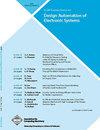Estimating Power, Performance, and Area for On-Sensor Deployment of AR/VR Workloads Using an Analytical Framework
IF 2.2
4区 计算机科学
Q3 COMPUTER SCIENCE, HARDWARE & ARCHITECTURE
ACM Transactions on Design Automation of Electronic Systems
Pub Date : 2024-06-07
DOI:10.1145/3670404
引用次数: 0
Abstract
Augmented Reality and Virtual Reality have emerged as the next frontier of intelligent image sensors and computer systems. In these systems, 3D die stacking stands out as a compelling solution, enabling in-situ processing capability of the sensory data for tasks such as image classification and object detection at low power, low latency, and a small form factor. These intelligent 3D CMOS Image Sensor (CIS) systems present a wide design space, encompassing multiple domains (e.g., computer vision algorithms, circuit design, system architecture, and semiconductor technology, including 3D stacking) that have not been explored in-depth so far. This paper aims to fill this gap. We first present an analytical evaluation framework, STAR-3DSim, dedicated to rapid pre-RTL evaluation of 3D-CIS systems capturing the entire stack from the pixel layer to the on-sensor processor layer. With STAR-3DSim, we then propose several knobs for PPA (power, performance, area) improvement of the Deep Neural Network (DNN) accelerator that can provide up to 53%, 41%, and 63% reduction in energy, latency, and area, respectively, across a broad set of relevant AR/VR workloads. Lastly, we present full-system evaluation results by taking image sensing, cross-tier data transfer, and off-sensor communication into consideration.使用分析框架估算 AR/VR 工作负载传感器上部署的功率、性能和面积
增强现实和虚拟现实已成为智能图像传感器和计算机系统的下一个前沿领域。在这些系统中,三维芯片堆叠是一种引人注目的解决方案,它能以低功耗、低延迟和小外形尺寸实现感知数据的原位处理能力,以完成图像分类和物体检测等任务。这些智能 3D CMOS 图像传感器 (CIS) 系统具有广阔的设计空间,涵盖多个领域(如计算机视觉算法、电路设计、系统架构和半导体技术,包括 3D 堆叠),迄今为止尚未对其进行深入探讨。本文旨在填补这一空白。我们首先提出了一个分析评估框架 STAR-3DSim,专门用于快速预 RTL 评估 3D-CIS 系统,捕捉从像素层到传感器处理器层的整个堆栈。通过 STAR-3DSim,我们提出了改进深度神经网络(DNN)加速器 PPA(功耗、性能、面积)的几个旋钮,这些旋钮可以在广泛的相关 AR/VR 工作负载中将能耗、延迟和面积分别降低 53%、41% 和 63%。最后,我们将图像传感、跨层数据传输和非传感器通信考虑在内,介绍了全系统评估结果。
本文章由计算机程序翻译,如有差异,请以英文原文为准。
求助全文
约1分钟内获得全文
求助全文
来源期刊
CiteScore
3.20
自引率
7.10%
发文量
105
审稿时长
3 months
期刊介绍:
TODAES is a premier ACM journal in design and automation of electronic systems. It publishes innovative work documenting significant research and development advances on the specification, design, analysis, simulation, testing, and evaluation of electronic systems, emphasizing a computer science/engineering orientation. Both theoretical analysis and practical solutions are welcome.

 求助内容:
求助内容: 应助结果提醒方式:
应助结果提醒方式:


